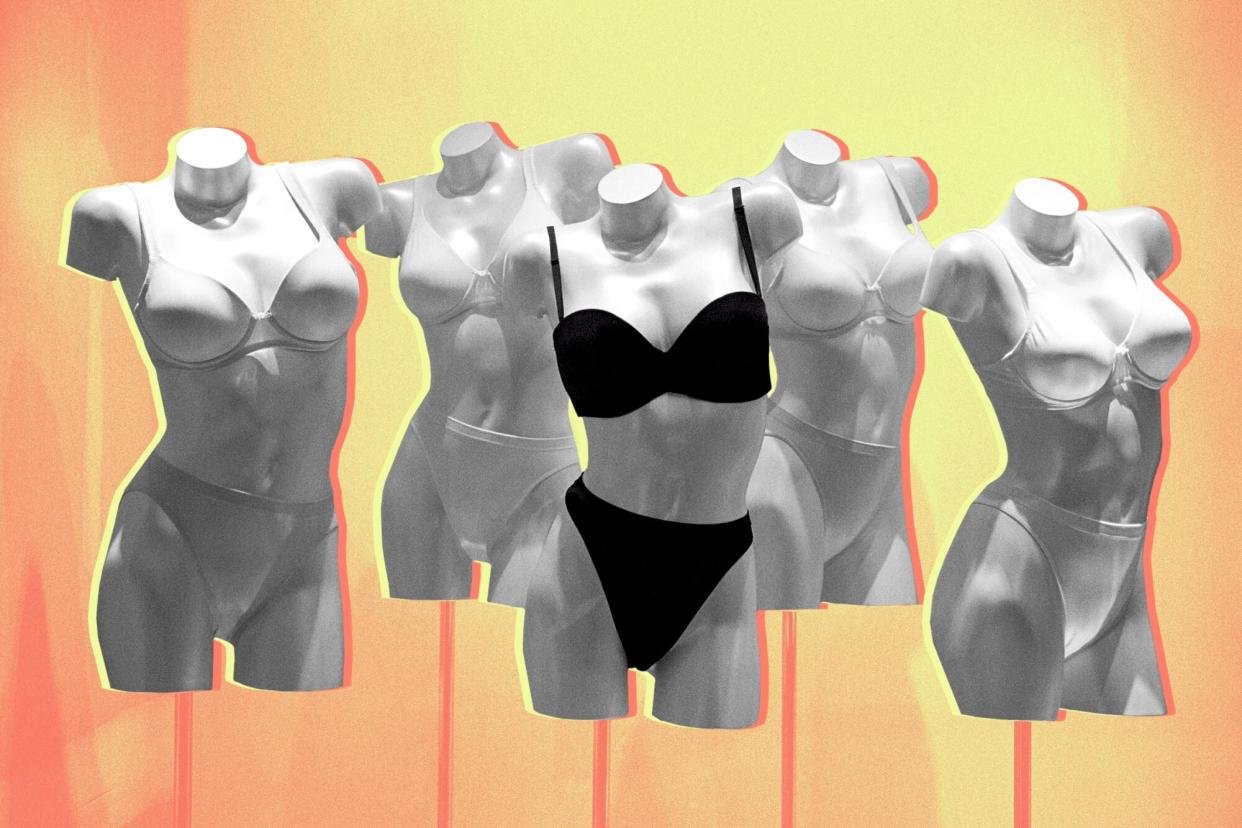Watching the Victoria's Secret Documentary as a Millennial Is a Cringey Walk Down Memory Lane

Getty Images
As a '90s baby who experienced adolescence during the early aughts, I walked by images of the Victoria's Secret "Angels" in the windows of Flatbush Avenue's Atlantic Mall in Brooklyn every day growing up. Watching the VS fashion show on TV during high school was akin to watching a championship sporting event, and their sculpted, thin bodies have been hammered into my brain as the pinnacle of beauty ever since. Now, years after the brand's peak popularity in the early 2010s, a new documentary series on Hulu is reminding me just how central the brand was to the toxic beauty standards I — and many others — still grapple with today.
The three-part documentary series, Victoria's Secret: Angels and Demons, explores the grip the lingerie brand had on culture and fashion in the early 2000s and the lasting impacts of the unrealistic body standards the company touted. Journalists and former VS employees use the word "unattainable" over and over again throughout the documentary as reels of models blowing kisses at the camera as they walk down runways in elaborate wings play in the background, taking viewers right back to 2010. The documentary serves as a reminder of how problematic the brand was to women's self-esteem and body image in its heyday, and that's not even scratching the surface of what other controversies the docuseries dug up about the brand. Related: The Abercrombie & Fitch Documentary Highlights the Importance of Size Inclusivity In Fashion
The tall, thin, toned, large-breasted models showcased by Victoria's Secret (and other brands during that era) were not only harmful to my self-image as a teen but also to young women everywhere. For instance, exposure to "the thin beauty ideal, as portrayed in mass media" led to increases in body dissatisfaction, according to a 2001 analysis of 25 different experiments published in the International Journal of Eating Disorders. Later, a 2004 study found that looking at "thin-ideal magazine images" had troubling effects, including negative moods, eating disorder symptoms, and decreased self-esteem.
While there's still work to do, the new documentary showcases how far other brands have come in terms of representing what women's bodies look like and what consumers actually want to wear (no more itchy, lacy thongs, please). It draws attention to Lane Bryant, a women's apparel company that focuses on plus-size clothing and even created a campaign titled "I'm No Angel" in 2015 in direct response to Victoria's Secret's outdated beauty standards, signaling a change in the culture and the fashion industry as a whole. The series also reminds viewers of a particularly tone-deaf interview of former Victoria's Secret chief marketing officer Ed Razek published in Vogue in 2018. In the interview, he made it clear he didn't feel the need to compete with newer, more inclusive lingerie brands, seemingly because he wasn't interested in attracting clients who didn't meet this "fantasy." He even referenced ThirdLove (a brand known for its comfortable undergarments and authentic marketing imagery) specifically. At the time ThirdLove published an open letter to VS, criticizing the brand for its exclusivity, writing, "You market to men and sell a male fantasy to women."
With a big push from plummeting stocks, the #MeToo movement, and new and reimaged brands now offering (and visually showcasing) lingerie for a wider range of body types (such as Rihanna's Fenty and Aerie), Victoria's Secret has embarked on a massive rebrand over the past few years. In 2021, the company replaced its "Angels" with the "VS Collective," a group of diverse, accomplished women, including soccer superstar Megan Rapinoe and actress and tech-investor Priyanka Chopra Jonas. The company also has a new team dedicated to consulting with the women of the VS Collective regarding product collections, content, and internal programs. It's even taking notes from TikTok star Remi Bader (famous for her "realistic" clothing hauls), who is now a brand ambassador and size consultant for Victoria's Secret PINK, a division of the brand aimed at younger consumers.
News of the brand's makeover was initially met with much skepticism and whether or not consumers will buy into it still remains to be seen. Although Victoria's Secret has recently launched comfort-focused collections, such as the Love Cloud collection, and updated its marketing and e-commerce imagery with more diverse body types, its stock share price is down more than 20 percent year-to-date. The company will have to prove its relaxed collections and more realistic campaign imagery aren't just empty public relations stunts but deeply intentional moves reflective of how Victoria's Secret truly understands how its reach can impact what generations of people consider to be "beautiful".
However, it's a big hill to climb considering a song about how Victoria's Secret prayed on the insecurities of young women is currently going viral on TikTok. A user recently wrote and shared a song that points that the lingerie brand was run by a man, profited off of people's body issues, and perpetuated a fantasy that impacted their relationship with food. Now, thousands of others are using the sound in TikTok videos.
Despite the fact that Victoria's Secret is attempting to rebrand itself and other more inclusive brands, including Aerie, ThirdLove, and Parade, are leading the charge into a new era of inclusivity and diversity, the negative consequences of the so-called VS fantasy live on in the form of social media influencers and diet culture. They also have lasting effects on those who grew up aspiring to an unrealistic image of beauty. "It's still pummeled into my brain that being hot is the most important thing to aspire to," I texted my younger sister while drafting this story. Hopefully, seeing more realistic and authentic examples of beauty in various forms within brand campaigns today will prevent some of the toxic, self-image issues my generation experienced.

